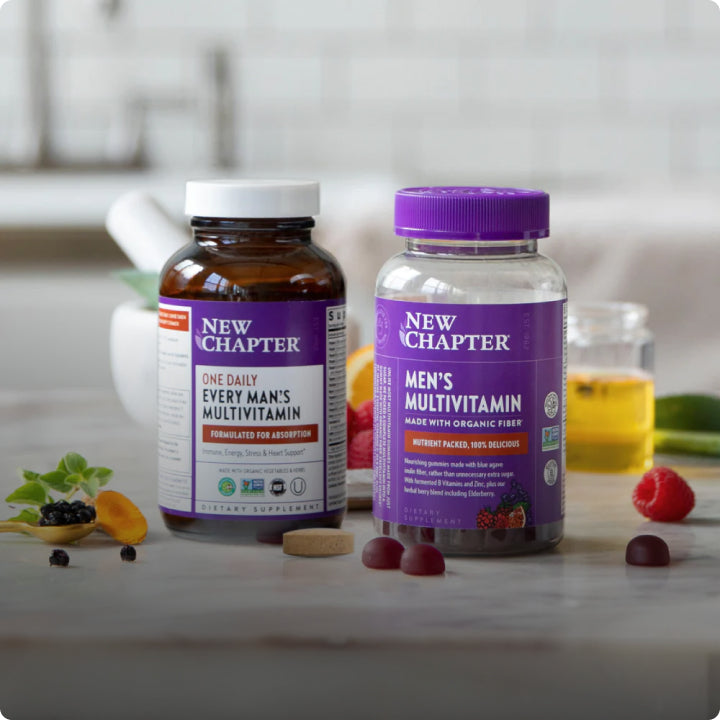Best Vitamins & Supplements for Athletes
Humans like to play sports, watch sports, and talk about sports. We admire the character, strength, and grit of our favorite athletes. If you’re an athlete or sports-lover, you know there’s something magical in competing to be your very best. No matter what kind of fitness journey you’re on, you might wonder about taking dietary supplements to get some specific benefits. Let’s check out popular ingredients for athletes, and how to pick the right ones for you!
Supplements for Athletes
Are you considering specific proteins, minerals, vitamins, or herbs for athletes? Some products may claim to be, say, the best herbs for runners, the best herbs for muscle recovery, or feature various health claims. It’s always a good idea to do your research when considering supplements for athletic performance. This could mean reading articles from reliable sources, talking to store associates, and checking with your healthcare professional. The following are some common supplement ingredients with solid research behind them.
Collagen
Collagen provides amino acids that are building blocks to support healthy joints.* Collagen is the most abundant protein in the human body. Collagen peptide supplements have been studied for supporting the function and flexibility of skeletal muscles and tendons.
Multivitamin
Athletes are physically active and desire speedy recovery to support their training. It’s important for active bodies to get sufficient micronutrients—vitamins and minerals—to support healthy function of the body’s many systems. Multivitamins can be a perfect combo of multiple micronutrients in just one tablet a day (or in delicious gummies!). For example, the active body needs Vitamin D3 and Zinc, as well as Chromium and Selenium—each can play a role in supporting healthy muscle function.*
Fish Oil
Scientific research links consumption of certain Omega fatty acids with a variety of health benefits, including muscle support. These beneficial Omegas include EPA (Eicosapentaenoic acid) and DHA (Docosahexaenoic acid) that are found in fish oils and microalgae oil. It’s believed that EPA and DHA support a healthy inflammation response in the body, which can in turn support muscle function.*
Magnesium
The adult body contains around 25 grams of the mineral Magnesium, with around 60% found in the bones and 27% found in muscle. Magnesium is linked to both the physical structure and the ongoing creation of skeletal muscle. It may also support muscle performance (how muscles contract and relax). If you’re weighing different Magnesium supplement options, be sure to look for a form that can be easily absorbed by the body, like Magnesium bisglycinate.
Vitamin D
Many cells in the body have Vitamin D receptors, and this includes your muscles. Research finds that Vitamin D plays an important role in how muscle cells grow and work. Several studies have shown a strong correlation between Vitamin D sufficiency and optimal muscle function. To put it another way, your body needs balanced levels of Vitamin D to support healthy muscle function and muscle recovery.
Zinc
Zinc is a mineral that supports the healthy functioning of skeletal muscle. According to a 2020 publication on Zinc and physical performance, Zinc “has been found to affect myogenesis [formation of muscle tissue] and muscle regeneration due to its effects on muscle cell activation, proliferation and differentiation.” A 2018 analysis of Zinc studies suggests that based on their lower levels of Zinc, athletes likely need more Zinc than people who aren’t physically active.
Ashwagandha
If you’re seeking herbs for strength, Ashwagandha (Withania somnifera) may help in this area. Specifically, an extract of Ashwagandha was shown to improve upper and lower body strength in recreationally active participants.
Protein
Unlike the micronutrients and herbs listed above, protein is one of three macronutrients that are absolutely essential for your health. (The other two macronutrients are carbohydrates and fat.) Of interest to athletes in particular, one of protein’s main roles in the body is acting as building blocks for building and repairing muscle tissue.
You should eat protein every day, and have a variety of sources so your body is getting all the essential amino acids. Most Americans do get enough protein. Here are some examples of protein-rich foods and supplements to help you plan a varied protein intake:

Sources for protein table: Harvard School of Public Health, USDA
Creatine
Depending on your preferred sport, you might have heard about supplementing with creatine as an “ergogenic aid.” (An ergogenic aid is a compound believed to support energy production or otherwise improve athletic performance.) Creatine is a compound that supplies muscles with energy. The body does produce some creatine daily, and it is also present in small amounts in meats and seafood. Various studies on creatine supplementation have shown that taking additional creatine may support lean muscle mass as well as increased exercise capacity and post-workout recovery. If you choose to take creatine, read the label carefully to make sure the product is creatine monohydrate and doesn’t contain unnecessary additives.
Turmeric
Turmeric (Curcuma longa) is a popular herb for active bodies because it delivers a studied compound called Curcumin. This phytonutrient from Turmeric has been linked to a healthy inflammation response that may be useful during athletic training and recovery. Keep in mind that there’s more to whole-herb Turmeric than just Curcumin—its other active compounds including Turmerones can actually help with proper Curcumin absorption.
Benefits of Supplements for Athletes
Physical activity is linked to countless benefits ranging from more restful sleep to better energy, right on up to increased lifespan. As an athlete, taking a thoughtful combination of ingredients in one or more targeted supplements can give you great tools for working toward your personal goals and personal bests. As described above, supplement benefits can include support for muscle function and recovery, bone health, immune function, physical endurance, and healthy inflammation response.* Check in with your healthcare professional on how the best supplements for athletes can help you, and whether you’ll take them every day (including training days and rest days).
Finding High-Quality Supplements
As an athlete, you probably scrutinize everything to be sure the ingredients are clean, tested, and trustworthy. One excellent way to confirm the quality of supplements you’re considering is to check for third-party verifications. Have independent and authoritative groups reviewed and confirmed that a supplement is, say, made with organic ingredients, approved for sport, or reviewed for risk of genetically modified organisms? Check the label to be sure!
History of Supplements for Athletes
Ancient accounts tell of athletes preparing for competition by consuming meats from animals that had the qualities they desired—like strength, speed, or stamina. Over the centuries, athletes have tried countless substances to gain a competitive edge, from gentle, natural ingredients to more extreme (and sometimes illegal) substances. Now that there are professional fields of study including sports nutrition and sports medicine, athletes and fitness buffs alike can get science-backed support in choosing the best regimens for their needs.
The Bottom Line
Pursuing athletic goals and personal records takes planning and persistence. As you follow through on workouts and rest days, you’re training your body to respond and adapt. Exercise stresses the body—that’s the point. For your active body, discover the ideal supplements that will help you train smart, stay strong, and recover well.

















